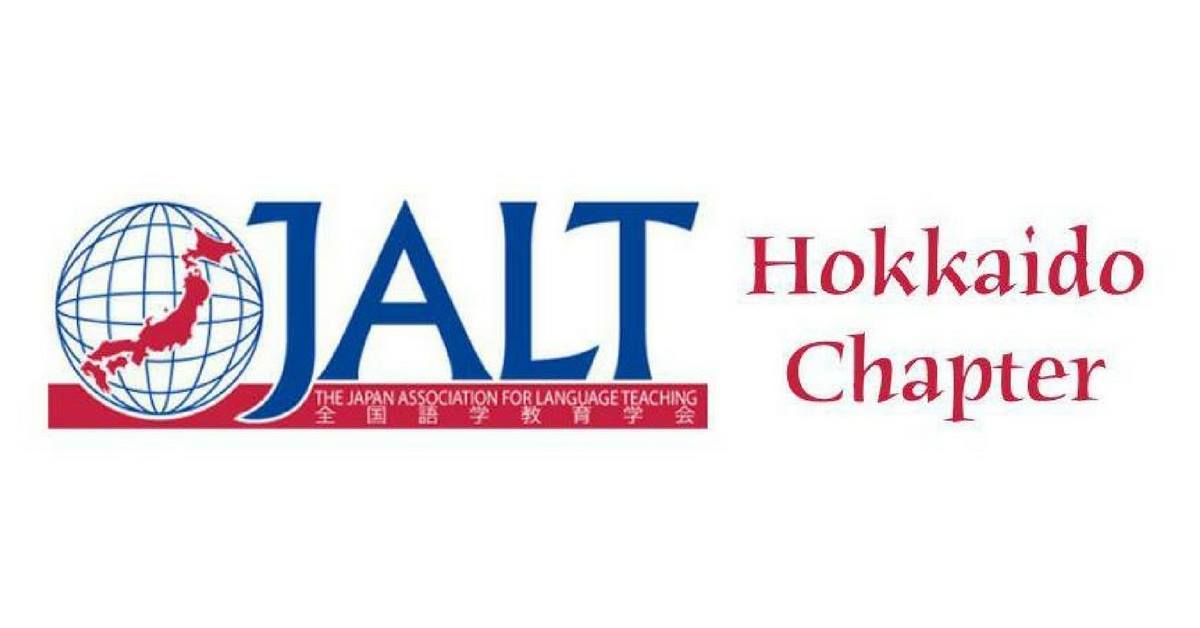Topic outline
2024
2024 Event 1 (日本語は以下)
JALT Hokkaido Winter Language Teaching Conference in Sapporo
February 3rd and 4th, 2024
Warm greetings from the team at JALT Hokkaido!We hope this message finds you in high spirits and ready for an exciting opportunity to enhance your professional development. As the winter chill settles in, we are thrilled to invite you to our upcoming JALT Hokkaido Winter Language Teaching Conference on Sunday, February 4th, at Hokkai-Gakuen University.Here's your chance to delve into a rich learning experience, surrounded by like-minded educators and professionals passionate about language teaching. Our conference promises a day filled with insightful presentations, interactive workshops, and engaging discussions that will not only inspire but also contribute to your growth as an educator.Why attend?1. Professional Development: Immerse yourself in a diverse range of sessions tailored to address current trends, innovative methodologies, and effective teaching strategies. Whether you're a seasoned educator or just starting your teaching journey, there's something for everyone!2. Networking Opportunities: Connect with fellow educators, share experiences, and build lasting relationships within the vibrant teaching community. Our conference provides a friendly and supportive environment for networking, fostering collaboration that extends beyond the event.3. Stay Updated: Keep abreast of the latest developments in language teaching, educational technology, and classroom management. The knowledge and insights gained will undoubtedly benefit your teaching practices and contribute to your students' success.4. Inspiration: Reignite your passion for teaching by exploring new ideas and approaches. Our lineup of speakers and presenters is carefully selected to inspire and motivate, ensuring you leave with a renewed sense of purpose and enthusiasm.Save the date, mark your calendar, and join us on February 4th for an unforgettable day of learning, growth, and camaraderie. Your presence will undoubtedly contribute to the success of this event, making it a true celebration of the teaching community in Hokkaido.Don't miss out on this fantastic opportunity to invest in your professional development and connect with fellow educators. We look forward to welcoming you to the JALT Hokkaido Winter Language Teaching Conference!February 3rd : Registration networking dinner at Sapporo Beer Garden. (6:30 - 8:10pm)February 4th : Full day of presentations (10am - 5pm)The schedule and program is set and we have a wonderful array of ingredients that will be going into our English Language Learning Smoothie!You can find all the information you need and register at the links below.The Call for Proposals has now finished.
Our keynote speaker is Pr Don Hinkelman and you can find his keynote title and bio by clicking on this link or his photo below.
Registration is now open at this link ...or click on the bear drinking the smoothie!
JALT北海道・全国語学教育学会
JALT北海道チームより、このメッセージを通じて、皆さまがお元気で、成長しながらワクワクされることを願っています。冬の寒さが広がる中、日本語教育学会北海道支部では、冬季言語教育カンファレンスを2024年2月4日(日)に北海学園大学で開催されることを心よりお知らせいたします。
このカンファレンスを通じて、豊かな学びをぜひ経験して下さい。同じ志を持つ教育者や言語教育に情熱を注ぐプロフェッショナルたちに囲まれ、洞察に富んだプレゼンテーション、対話的なワークショップ、そして教育者としての成長に寄与するエンゲージングな議論が詰まった一日になることでしょう。
なぜ参加するべきか?
1. プロフェッショナルディベロプメント: 現在のトレンド、革新的な手法、効果的な教育戦略に対処するさまざまなセッションに没頭してください。経験豊富な教育者であろうと、教育の旅を始めたばかりであろうと、どなたにも何かがあります!
2. ネットワーキングの機会: 仲間の教育者と繋がり、経験を共有し、イベントを超えて協力を促進するための友好的でサポーティブな環境が整っています。
3. 最新情報の入手: 言語教育、教育技術、教室のマネジメントの最新動向を把握しましょう。得られる知識と洞察は、確実にあなたの教育実践に利益をもたらし、学生の成功に寄与します。
4. インスピレーション: 新しいアイデアやアプローチを探索することで、教育への情熱を再燃させましょう。スピーカーやプレゼンターの発表を聞き、新たな目的意識と熱意を持ちかえり実践の場で活かしていくことを保証します。
カンファレンスの日程を保存し、カレンダーに印をつけて、2月4日に学びと成長、仲間との交流の忘れられない一日にご参加ください。皆さまの存在は、このイベントの成功に確実に貢献し、北海道の教育コミュニティの真の祝賀となります。 プロフェッショナルディベロプメントに投資し、仲間の教育者とつながる素晴らしい機会をお見逃しなく!
JALT北海道冬季言語教育カンファレンスでお会いできることを楽しみにしています!
- 2月3日:サッポロビールガーデンでの登録ネットワーキングディナー(6:30〜8:10pm)
- 2月4日:プレゼンテーションのフルデイ(10am - 5pm)
スケジュールとプログラムが決まり、英語学習スムージーに入る素晴らしいアレイが用意されています!
必要な情報と登録は以下のリンクでご確認いただけます。 皆さまにお会いできることを楽しみにしています!
JALT北海道オフィサー一同
2023
2023 Event 5
Teaching Sustainable Development Goals: Three Approaches
The Sustainable Development Goals have attained a dominant place in the public narrative both globally and here, in Japan. As a global phenomenon, it is appropriate that our students become familiar with precisely what they are. Also, it is important that they are able to interact with others in the international community with respect to the social and environmental issues that the SDGs present.
JALT Hokkaido’s own Tim Grose, Matt Cotter and Don Hinkelman, will give three different, but connected presentations, that offer different perspectives on how and why our students can benefit from a close study of these issues. Abstracts and bios for the presentations can be found the link below
Sunday, December 17, 2023
15:30 - Doors open
16:00 – 17:00 Presentations
17:00 - 17:15 AGM
17:15 ~ RefreshmentsThis event is free for all members and non-members (bring a friend!) but requires pre-registration.
Hokkai - Gakuen University, Kyoiku Kaikan , Gakuen Open Lounge Open Lounge. Access at the following link:
Abstracts and bios at the following link:This event has finished and a video will be uploaded in the near future.2023
2023 Event 4 JALT Hokkaido (Japanese below)
SATURDAY July 1st, 2023, 16:30
INTERCULTURAL AWARENESS SERIES: A Voice for Justice: Dr. Neal Hall's Poetry
Dr. Hall has written a total of eight poetry books. Furthermore, the literary creations of Dr. Hall have been translated into various languages, encompassing Japanese. One notable publication in Japanese is titled The Book: Weight of Just Black.
Hailed “as the Malcolm X of International Poetry," Hall’s poetry speaks beyond the surface pain of injustice and inhumanity. He is a poet of intellectual passion and artistic significance whose poetry has consistently championed socio-economic and socio-political issues pertinent to social advocacy. India’s revered Vasanth Kannabiran remarked, “All in all, he is a poet. And unquestionably one of the most significant voices of the century.” Dr. Hall will do some short readings of his work and then have a question and answer session about his work and experience as a poet.
Saturday July 1st, 2023 time: 16:30 (Pre register QR code)
Location: Hokkai-Gakuen University (Toyohira-Campus)
International Conference Room 6f
(Toyohira-ku, Asahimachi 4-chome 1-40
Exit #3 of the Gakuen-Mae subway station (toho line)
This event has been made free and open to the public
(Donations from non-JALT members appreciated)
異文化理解のためのシリーズイベント:社会における人種差別
Dr. Hallは合計8冊の詩集を執筆しました。さらに、Dr. Hallの文学作品は日本語を含むさまざまな言語に翻訳されました。日本語では、「The Book: Weight of Just Black」と題されています。
Dr. Hallは、「国際詩壇のマルコムX」と称され、彼の詩は不正や非人間性の表面的な痛みを超えたメッセージを伝えています。彼は知的な情熱と芸術的な重要性を持つ詩人であり、社会運動に関連する社会経済および社会政治の問題を一貫して支持してきました。インドの尊敬される詩人ヴァサント・カンナビランは、「彼は全般的に言って、彼は詩人です。そして、疑いの余地なく、この世紀で最も重要な声の一つです。」と述べています。Dr. Hallは自身の作品をいくつか朗読し、その後、詩人としての経験や作品に関する質疑応答セッションを行います。
講演者:ニール・ホール医学博士/詩人
日時: 2023年7月1日(土曜日) 16:30 (事前登録QRコード)
参加費:無料 一般公開されています
(JALT会員以外の方からの寄付も大歓迎です)
場所:北海学園大学(旭町豊平区4丁目1-40)図書館棟国際会議場6階
アクセス:学園前駅(東豊線)3番出口に直結
2023 Event 3 JALT Hokkaido (Japanese below)
Saturday, April 22, 2023 (18:00 – 19:30 JST)
A research summary on emotion regulation followed by a workshop on emotional intelligence
Presenter: Sam Morris
Abstracts
Presentation: Emotion Regulation by Language Teachers at a Japanese University (40 mins)
In recent years increased attention has been paid to the emotional dimension of language teaching, a consequence, perhaps, of the move towards an emotional turn in applied linguistics (e.g., White 2018). While much is being learnt about the subject-specific emotional demands language teachers face (e.g., Gkonou & Mercer, 2017; King, 2016, Gkonou et al. 2020), it is important to acknowledge that teachers have a great deal of agentive control over the emotions they experience and display in the classroom. The psychological, behavioural, and cognitive steps that individuals employ to manage their emotions are known formally as emotion regulation, and here I present data from a qualitatively driven study that explored the ‘how‘ and ‘why’ of the emotion regulation performed by 15 non-Japanese teachers working at a Japanese university. The data, collected through interviews, classroom observations, and stimulated recall sessions, demonstrates the numerous diverse strategies and motives underlying the participants’ emotion regulation decisions. Such decisions which were themselves driven by subjective interpretations of both internal and external contextual forces, including the teachers’ past experiences, critical classroom incidents, institutional expectations, and the greater sociocultural climate. Implications will be drawn for teachers, managers, and institutions with regards to adaptive emotion regulation that best serves teacher well-being and student learning.
Workshop: Activities for teaching students about emotions (50 minutes)
Notions of emotional intelligence and emotional health are more important than ever given current world events, and since language teachers are increasingly integrating content-based knowledge within their instruction, there are numerous opportunities to broach the science of emotions within the language classroom. In this workshop I share materials and instruction for CLIL-informed, discussion-based activities that teach learners about how their emotions function, and about how they can more ably manage emotional stress in their working lives. Each activity will be presented with attention to the content-based theory underlying the learning, as well as to potential linguistic foci. The activities have been designed and implemented with undergraduate learners, but discussion for adapting to other ages and contexts will also take place.
Format: Online (Zoom)
Attendees: a Zoom link and password will be sent to attendees upon registration.
Registration (required)
Register your attendance at the following link https://jalthokkaido.peatix.com
Admission Fees
JALT Members, JALT Hokkaido Local Members and students - Free admission
Non-JALT members: 500 yen pre-registered (see below)
Non-JALT members: *500 yen
*As an NPO, our members finance the costs to host the quality presenters we bring to Hokkaido. To help us cover our costs, we would like non-JALT attendees to contribute by paying an attendance fee of 500 yen. This will entitle you to ask questions to the presenter during the Q&A session as well as get access to the video.
Presenter Profile
Sam Morris teaches in the Center for Foreign Language Education and Research at Rikkyo University. He is broadly interested in the affective and emotional dimensions of language teaching and learning and studied his PhD at the University of Leicester (UK). His most recent research has explored the emotion regulation decisions that language teachers make and the impact that these have on various facets of classroom practice.
題名:感情知能に関するワークショップと感情制御に関する研究概要
発表者:サム モリス
日時:4月22日(土)午後18:00-19:30
会場:ズーム
開催方法:オンライン
参加費:会員無料、非会員オンライン参加の非会員500円 ※1
講演概要
プレゼン発表:日本の大学での語学教員による感情制御(40分)
近年では、言語指導での感情範囲に高い注目が集まっており、おそらく結果として応用言語学では感情的な方向転換への動きがある(e.g., White 2018)。教員が直面する教科に特定した感情的要求については多くが明らかになった(e.g., Gknonou & Mercer, 2017; King, 2016, Gkonou et al. 2020) 一方、教員は経験した感情を教室で見せることよりもエージェント制御の方が多いことを認識することが大切である。個人が感情を管理するために心理学的、行動的、認知的ステップを用いることは、感情制御として知らており、ここでは、日本の大学で教鞭をとられている15人の外国人教員による感情制御の「どのように」と「なぜ」についての質的研究データを発表する。データは、インタビュー、授業観察、刺激された想起の時間を通して集められた。これらは、参加者の感情制御や決定に基づいた様々なストラテジーと動機を提示する。このような決定は、教員の過去の経験、教室での決定的な出来事、機関での期待、広くて社会文化的な風潮を含めた内部と外部の文脈的な力によるものである。これらの意味は、健康的な教員と学生の学習に最も使われる適応感情制御に関するものであり、教員、管理者、機関にとって重要である。
ワークショップ:学生に対する感情指導の活動について(50分)
感情知能と情緒的健康の概念は現在の世界の出来事よりも重要である。語学教員は内容ベースの知識を指導と統合することが増えており、また、語学教室内での感情の科学を持ちだす機会がとても多くあるためである。今回のワークショップでは、資料とCLILに基づいた指導やディスカッションベースの活動を共有する。これらは、学習者に感情の機能や日常生活における感情ストレスをさらに上手にコントロールする方法を指導する。それぞれの活動は、学習と言語学に基づいたコンテンツベースの理論と一緒に発表される。これらの活動は、学部生と一緒にデザインならびに実践されたが、ディスカッションは他の年齢や文脈に対応して行われる予定である。
開催方法:オンラインzoomリンク等は事前参加申込後にて通知
オンラインでの参加者数は無制限です。 感染状況の悪化により、オンラインのみの開催になる可能性があります。 その際はご連絡致します。
参加申込(必須)
こちらのリンクより事前参加申込が必要 https://jalthokkaido.peatix.com
発表者略歴
サム モリス氏はCenter for Foreign Language Educationでの指導、ならびに立教大学で研究をされています。また、言語指導や言語学習における感情の範囲について幅広く興味を持たれており、イギリスのレスター大学では博士課程を修了されました。最も最近の研究では、言語教員が作る感情制御の範囲とクラスルームでの実践における様々な様相に対するインパクトについて調査されたことがあります。
※1 オンライン参加費(非会員500円)について
NPO法人として、質の高い発表者を北海道に招聘するための費用は会員が負担しています。 そのため、オンライン参加者の方にも、参加費として500円をご負担いただきたいと考えています。参加費500円の支払いにより質疑応答時の発表者への質問や、講演ビデオへのアクセスが可能になります。
2023 JALT Hokkaido Winter Language Teaching Conference (Saturday, February 4th - 5th)
"New Directions and New Techniques: Teaching in the New Normal"
Sunday, February 5th, at Hokkai-Gakuen University in Sapporo.
(Japanese Below)
Abstract Submissions now closed
This year, JALT Hokkaido, The Performance in Education (PIE) JALT Special Interest Group, and Okinawa JALT are hosting a two-day conference at two locations in Sapporo: Sapporo Cultural Arts Community Center (SCART) on Saturday, February 4th, and Hokkai-Gakuen University on Sunday, February 5th.
PLEASE NOTE: Both Saturday and Sunday will be face-to-face and on-site only. All precautions will be taken according to government and venue regulations to ensure a safe environment. You will be informed of those regulations as the conference date approaches and all participants will be expected to conform to those regulations.
There will be a full lineup of presentations, a student showcase, a symposium with education leaders, and publisher displays on Sunday, February 5th, with a networking social get-together on Saturday night.
Our keynote speaker, Professor Marc Helgesen will be giving a plenary on what happens when students are happy in the classroom, and how teachers can facilitate this happiness. He will also run a workshop about positivity in the classroom. Not to be missed!Click on the taster videos from Mark here so you can see what he will be talking about.Read below for the PIE SIG information (Saturday presentations).
Performance in Education (PIE) SIG Conference
THEME: “New Directions and New Techniques: Teaching in Performance in Education in the New Normal”
This is the theme for the PIE SIG portion of the conference. The PIE SIG is completely responsible for the program and management of the Saturday, February 4th conference (held at SCART) and is responsible for programming and management for one room on Sunday, February 5th at Hokkai-Gakuen University.Conference Fees for each day:
JALT Members, JALT Hokkaido Local Members, and students:Free if pre-registered, ¥1,000 if not pre-registered
Non-members: ¥1,500 if pre-registered; ¥2,000 if not pre-registered
Pre-register deadline: Saturday, February 4th, 23:59pm
(Deadline to register for Saturday dinner: February 3rd, 23:59pm. Same registration form)
No same day registrations.Pre-register here with the QR Code or click on the bear to take you to the form!
Schedule here
https://docs.google.com/spreadsheets/d/1JG855AihXdgZXidZLd5EGxTof_ZIO0hc-nfSuD4vCEQ/edit#gid=2994499
(2023年) 第36回全国語学教育学会(JALT)北海道支部研究大会「アフターコロナにおける新しい日常:新しい方向性と新しい技術」における発表要旨(アブストラクト)募集のお知らせ
今年度もJALT北海道支部とThe Performance in Education (PIE) JALT Special Interest Group、およびJALT沖縄支部は、札幌市内の2つの会場において2日間の研究大会を合同開催します。2月4日(土)は札幌文化芸術劇場(SCARTS(スカーツ)コート)にて、2月5日(日)は北海学園大学にて開催されます。
登録はもまなく!
【注意】土曜日、日曜日ともに対面式で会場のみでの発表となります。安全な環境を確保するため、政府および会場の規則に準じ予防措置を講じます。大会開催日が近づきましたら詳細をお知らせしますので、全参加者として選ばれた場合はこれらの規制に従って頂くことになります。
2月5日(日)には、発表や学生ショーケース、教育界のリーダーによるシンポジウム、また出版社の展示など、充実したラインナップが予定されており、土曜日の夜にはネットワーキングのための懇親会が開催されます。
基調講演者である Marc Helgesen 教授は、生徒が教室で幸せなときに何が起こるか、教師がこの幸せをどのように促進できるかについて全体会議を行います。 マーク・ヘレガスン先生が教室で積極性に関するワークショップも開催します。 お見逃しなく!
PIE SIGの情報は下記をご覧ください(土曜日の発表のための投稿)
The Performance in Education (PIE) JALT Special Interest Group研究大会
テーマ:「新しい方向性と新しい技法。ニューノーマルにおける教育現場でのパフォーマンス指導」
これは、本研究大会のPIE SIG部分のテーマです。PIE SIGは、2月4日(土)の研究大会(SCARTS(スカーツ)コートで開催)のプログラムと運営を担当し、2月5日(日)の北海学園大学での1会場のプログラムと運営を担当します。
各日の参加費 : ALT全国会員、JALT北海道支部会員、学生:事前登録者は無料、事前登録なしの場合1,000円
非会員:事前登録者は1,500円、事前登録なしの場合2,000円
事前登録締め切り:2月4日(土)23時59分 (土曜日のディナーの登録期限: 2 月 3 日 23 時 59 分。同じ登録フォーム) 当日登録はありません。
事前登録はQRコード又は熊にクリック!
スケジュールはこちらhttps://docs.google.com/spreadsheets/d/1JG855AihXdgZXidZLd5EGxTof_ZIO0hc-nfSuD4vCEQ/edit#gid=2994499
For those wanting the full PowerPoints, please email Marc at marchelgesen@gmail.com so he can send them via WeTransfer. Please indicate which files you would like.
For the pdfs, vidoes not clickable in the pdfs are below.
Paul Rugg (an actor) talking about oxytocin with his dog is at
Tyra Banks talking about SMIZE is atThe "energy break" exercise is one of the ones at
2022
2022 Event 3 (Hybrid) JALT Hokkaido (Japanese below)
Saturday, August 20, 2022 (16:00 – 18:30 JST)
Teaching Fluency using the Verbal Classrooms method
Presenter: José Domingo Cruz
Abstract
All teachers want their students to achieve higher levels of fluency, but how to teach it, and which classroom methods actually work? The presenter has been teaching fluency-based speaking classes for over 20 years, and will share his methods and theories to get students to speak faster and to say more. In addition to a basic description of the essentials of his teaching techniques, he will demonstrate some classroom activities, from the basic Answer-Question pattern (AQp) to, One Idea, One Breath (OIOB) which is aimed at fluency improvement, and others such as Timed Speeches and, Disagreements. Time permitting, there will also be an introduction to his Authentic Listening / fluency practice website, GOLDFish365 - https://goldfish365.com/
Format: Hybrid Presentation - this presentation took place at Hokkai-Gakuen University and also online via Zoom.
Presenter Profile
José Domingo Cruz has given numerous presentations and keynote presentation for various conferences and educational events and works on several English study projects, including his main venture, “GOLDFish365”. Cruz is the author of, “Teaching with ZOOM 2” Published by Wayzgoose Press. He helped create the protocols for and led the team of volunteer Room Hosts that guided the presentations for the pioneering online conferences for PANSig and the JALT National conferences of the pandemic year of 2020 (The Fire Station). Cruz is a leading member of Online Teaching Japan, an online discussion group on Facebook centering on topics related to professional development for pedagogy, and where he hosts the broadcasts of “OTJtv”. Cruz is from Canada, and is a veteran university instructor and Japan resident, specializing in fluency instruction, authentic materials creation, and online education.
題名:バーバルクラスルーム方式による流暢性の指導法
発表者:ホセ・ドミンゴ・クルス氏
日時:8月20日(土)午後16:00-18:30(対面の方午後16:00から会場に入れます)
会場:北海学園大学 国際会議場(図書館棟6階)
開催方法:ハイブリット
講演概要
どの教師も生徒により高いレベルの流暢さを身につけてほしいと願っていますが、どのように教えればよいのでしょうか、またどの授業方法が実際に効果的なのでしょうか。本セミナーでは、20年以上にわたり流暢性を重視したスピーキングクラスを指導してきた発表者が、生徒をより速く、より多く発話させるための方法と理論について紹介します。基本的なAQp(Answer-Questionパターン)から、流暢性の向上を目的としたOIOB(One Idea, One Breath)、さらに時間を計測するスピーチやDisagreementなどのクラスアクティビティを実演しながら、指導法の要点を説明します。また、Authentic Listening / Fluency Practiceのウェブサイト、GOLDFish365 - https://goldfish365.com/ の紹介も行う予定です。
発表者略歴
ホセ・ドミンゴ・クルス 様々な会議や教育イベントで数多くのプレゼンテーションや基調講演を行い、自身の主たるベンチャーである「GOLDFish365」を含むいくつかの英語学習プロジェクトに取り組んでいる。著書に「Teaching with ZOOM 2」(Wayzgoose Press刊)がある。PANSigや2020年のパンデミックイヤーのJALT全国会議の先駆的なオンライン会議(The Fire Station)で、プレゼンテーションを指導するボランティアのルームホストのプロトコルの作成と指導に携わる。また、教育学の専門家育成に関するトピックを取り上げるFacebook上のオンライングループ「Online Teaching Japan」の主要メンバーでもあり、「OTJtv」の放送を担当。カナダ出身。日本在住の大学講師として、流暢さの指導、オーセンティックな教材の開発、オンライン教育を専門とする。
You can see the whole video recording of this presentation below.
2022 Event 2 JALT Hokkaido Video of this event below
January 29, 2021 (17:30 - 19:30 JST)
Diagnostic EFL Listening Teaching Methods Based on Theories and Evidence

Presenter: Dr. Marisa Ueda
Click below for a full video of this workshop.
Abstract
This workshop aims to demonstrate diagnostic EFL listening teaching methods especially for Japanese learners of English based on evidence and two theories on human information processing and the metacognitive process of language learning. Despite a high number of new materials available for EFL listening and the invention of audio technology in the past 50 years, actual classroom teaching methods in EFL listening have changed little: Play an audio file, make learners answer questions, tell them the answers, give handouts (translations, audio scripts and vocabulary) and tell them to keep listening to the audio files until they fully understand them. These ways are NOT instructional because learners are left alone to work out for themselves: where/why their comprehension broke down and how to overcome their problems. Testing and teaching are NOT the same, yet this is not always realised even by us teachers. How can theories and evidence be applied to classroom practice? The audience is expected to be actively involved. First, the audience will be introduced to two fundamental theories about human information processing and the metacognitive process of language learning. Then they will learn how to find where/why learners’ comprehension broke down, mostly based on evidence. After that, the audience will be shown how to fix these problems diagnostically, depending on the causes. By the end of this workshop, the audience will have gained a degree of confidence in diagnostic EFL listening instruction. If you are not confident in teaching EFL listening, this workshop is for you. For further information, please visit http://listening-marisa.com. For any enquiries, please contact at marisa@ec.rutsumei.ac.jpPresenter Profile
Marisa Ueda (marisa@ec.ritsumei.ac.jp) is a professor at Ritsumeikan University (Japan). She has got a Diploma in T.E.F.L. at the University of East Anglia (England) and an M.A. in Applied Linguistics at the University of Reading (England). She studied Cognitive and Computing Sciences for her D.Phil. at the University of Sussex (England) and completed her Ph.D. at Osaka University (Japan). Her doctoral research was about EFL Listening focusing on intermediate learners. Her research interests include EFL listening instruction methods with strategies and metacognition through scientific approaches based on theories and evidence. She was a visiting researcher at the University of Lancaster (England) in 2006-2007 and the University of Reading (England) in 2019-2020. Her five-year research project has been supported and funded by the Japan Society for the Promotion of Science KAKENHI, Grant-in-Aid for Scientific Research (C), Grant Number P17K03037 since 2017. Her PhD thesis was published with research funding in 2015. For more information about EFL listening instruction methods based on theories and evidence, please visit http://listening-marisa.com Her book about EFL listening is published in Japan and translated and published in Taiwan as well; 聽見英國—英式英語實境聽力練習.
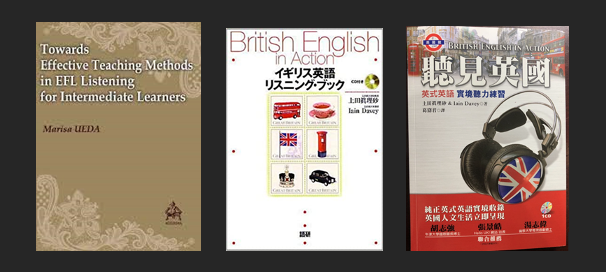
オープン・セミナー題目 理論とエビデンスに基づいた診断的リスニング指導法
概要
このセミナーでは、特に日本人英語学習者を対象として「人間の情報処理に関する理論」と「言語 理解に関する理論」の2つの理論とエビデンス(統計学的に有意差があったデータ)を元に診断的 リスニング指導法を紹介します。過去、半世紀において、膨大な数のリスニングに関する教材が出 版されてきました。また、この半世紀で音声の録音や再生技術には大変な進化がありました。しか し、リスニング指導においてはほとんど進化がないというのが現実です。教員は音声を再生し、学 習者がそれを聞いて解答する。教員が解答を伝えて、オーディオ・スクリプトや日本語訳、単語の プリントを配る。文法や意味の説明がされることもあるかもしれません。そして必ず教員は最後に こういうのです。「わからないところや間違ったところがある人は、わかるまで何回も聞いておきま しょう」と。これは指導ではありません。「指導」というのは、「どこで」「何故間違ったのか・ わからなくなったのか」「どうすれば良いのか」を教えることなのです。 2つの理論の内容はどんなものでしょうか?エビデンスの具体的な詳細は、どういったものでしょ うか?2つの理論とエビデンスはリスニング指導にどのように関係しているのでしょうか?「どこ で」「何故間違ったのか・わからなくなったのか」「どうすれば良いのか」を指導できるようになる には、どうしたらいいのでしょうか?これら全部の質問の答えはセミナーで明らかになります。セ ミナーでは加者の皆さんに実際にセミナー内で意見交換してもらったり、実際に体験してもらった りと参加型のセミナーです。リスニングを自己流で指導してきた方やリスニング指導に自信がない 方へお勧めのセミナーです。 より詳しい内容はコチラのサイトを御覧下さい。
http://listening-marisa.com お問い合わせはコチラまで marisa@ec.rutsumei.ac.jp上田氏の立命館大学プロフィールのページでは、上田氏の日本語の経歴を https://research-db.ritsumei.ac.jp/rithp/k03/resid/S002149?lang=ja#952-100 でご覧いただけます。
2022 Event 1 JALT Hokkaido
January 29, 2021 (17:00 - 17:30 JST)
43rd AGM and Election of Officers
JALT Hokkaido 43rd AGM and Election of Officers covered officer reports from 2021, what we have planned for 2022 and announcement of JALT Hokkaido officers for 2022. (The election for 2022 officers was carried out online.)
The short video of the full AGM is below. (click)
2021 Event 2 HMSW - September 5
2021 Event 2 JALT Hokkaido
Hokkaido Moodle Summer Workshop (HMSW 2021) September 6, 2021
Sponsored by - Moodle Association of Japan
Hokkaido Chapter and JALT Hokkaido Chapter
会議の場所:Location: All Online (click on link below, no password required)
Event finished so Link deleted
Meeting ID: 897 1503 8293 Passcode: 830020
日程:Schedule of Invited Presenters
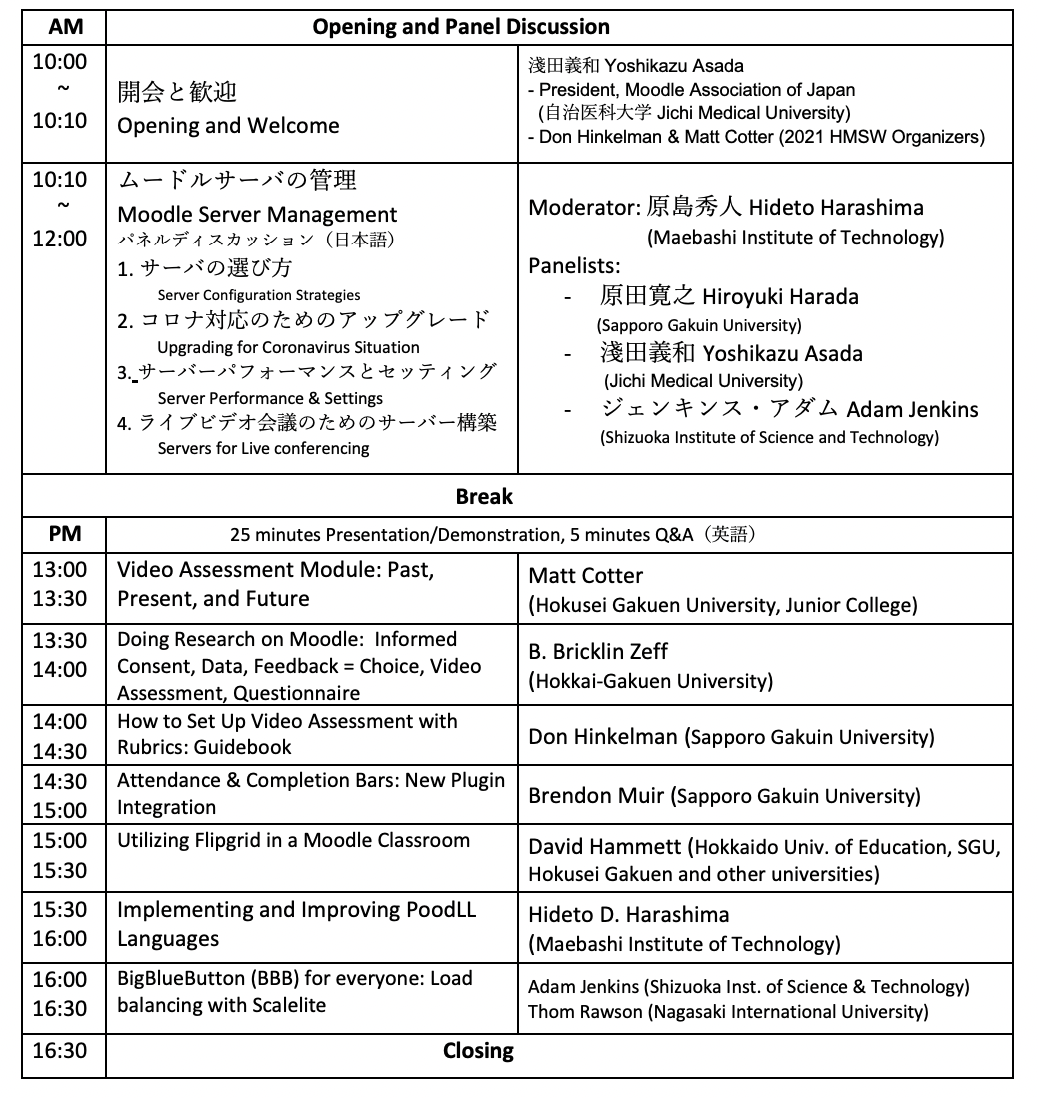
Watch video recording of Moodle Server Managment (1 hour, 51 minutes)
2021 Event 3 Presentation - October 2
2021 Event 3 JALT Hokkaido (Japanese below)
October 2, 2021 (18:00 - 19:30 JST)
Creating a Space for CLIL: Strategies for Adoption and Implementation)
Presenter: Nate Olson
Event finished. Link to videos (in four parts) of this event here:If you have any questions you can direct them to the presenter at his websiteAbstract:
Content and language integrated learning (CLIL) is a dual-focused educational approach where students learn content through language and language through content, for example, learn History using English, and learn English through History. In recent years, CLIL has made inroads into Japan. CLIL has been heralded as a transformative pedagogy for better education and a teaching method able to nurture so-called globally competent people. However, English educators in Japan are still struggling on how to best adopt and implement CLIL in their teaching contexts. In this interactive session, the presenter will give a brief history of the approach, its theory, and how it fits into the current national policy for English education in Japan.The session is not intended to be a lecture, so please be prepared to share your own ideas and learn from your peers.
How can textbooks be adapted to fit a CLIL approach? How can we scaffold for students’ content and language needs? How can we assess students with CLIL? These questions, amongst others, will be discussed during the session.
The workshop focuses on the particular challenges of adopting and implementing CLIL for primary and secondary ALTs as well as post-secondary instructors. Within a series of breakout room sessions, participants will discuss CLIL concepts and strategies for overcoming challenges for their respective teaching contexts. Drawing from practice and research, the presenter will then share models, templates, and examples of CLIL and how it can be implemented in a variety of classrooms. From choosing a content subject to planning a lesson to creating tasks and projects, participants will take home helpful resources for building out their own CLIL lessons from scratch.
Presenter Profile:
Nate Olson is a PhD candidate in Applied Linguistics at Sophia University. Originally from Minnesota, he has lived in Japan for twelve years and taught English at all levels from elementary school to university. A former ALT and Prefectural Advisor on the JET Program, he has a M.Ed. in TESOL and currently conducts research on teacher collaboration for implementing CLIL in pre- tertiary contexts.
寄付を ご検討ください。 ご寄付は下記の登録フ ォームから簡単に行うことができます。タイトル: CLILのための空間作り:導入と実施のための戦略 日時:10 月 2(日)18:00-19:30
発表者:ネイト・オルソン氏Location: Zoom
下記の登録フォームから簡単な登録が必要です。ご登録を確認後、イベント当日にZ oomリンクとパスワードをメールでお送りします。
CLIL(Content and Language Integrated Learning)とは、「英語を使って歴史を学び、歴 史を通して英語を学ぶ」というように、言語を通してコンテンツを学び、コンテンツを通し て言語を学ぶという二元的な教育手法のことです。近年、日本でも CLIL の導入が進んでい ます。CLIL はより良い教育のための変革的な教育法であり、いわゆるグローバルに通用す る人材を育成できる教授法であると謳われています。しかし、日本の英語教育関係者は CLIL をどのように導入していけばよいのか模索しているのが現状です。この対話型セッシ ョンでは、発表者がこのアプローチの歴史、理論、そして現在の日本の英語教育の政策にど のように適合しているかについて簡潔に説明します。このセッションはレクチャーを目的と したものではありませんので、ご自身のアイデアを共有したり、他の参加者から学んだりす る準備をしておいてください。
CLIL アプローチに教科書を適合させるにはどうすればよいか?学習者における内容や言語 のニーズに合わせて、どのように支援することができるのか?CLIL における学習者評価は どうすればよいか?このような疑問を中心に議論します。このワークショップでは、初等・中等教育の ALT や高等教育の講師が CLIL を導入・実施す る際の課題に焦点を当て、いくつかの分科会に分かれて、CLIL のコンセプトやそれぞれの 教育現場で課題を克服するための戦略について議論します。そして、実践と研究から導き出 された CLIL のモデル、テンプレート、例を共有し、様々な教室でどのように CLIL を実施す ることができるかを説明します。内容の選択からレッスンの計画、タスクやプロジェクトの 作成まで、参加者は自分の CLIL レッスンをゼロから構築するために役立つリソースを持ち 帰ることができます。発表者略歴
上智大学応用言語学博士課程に在籍中。ミネソタ州出 身、日本在住 12 年間、小学校から大学まであらゆるレベ ルで英語を教授。元 ALT で、JET プログラムの都道府県ア ドバイザーを務めた後、TESOL の修士号を取得し、現在は 中等教育までのレベルにおける CLIL 実施のための教師の コラボレーションに関する研究に従事している。
2021 Event 1 Presentation - June 12
2021 Event 1 JALT Hokkaido
Title: Does Performance-Based Language Assessment Really Work?
A Case Study in Hokkaido, Japan

Click on the thumbnail below to view the full video of this event.
Also a pdf version of the slides used is downloadable from beneath this post.
Date: Saturday, 12 June, 2021 (18:00 - 19:00 Presentation, 19:00 – 19:20 Q&A)
Location: Zoom Webinar (After we have confirmed your membership or fee payment via the registration form at the link below, we will send you the Zoom link and password by email on the day of the event.)
https://forms.gle/vik2izkqsCJhDCEUA
JALT Members and students - Free admission
Non-JALT members : We would appreciate a donation of 500 yen payable through PayPal or bank transfer. (If a JALT member sponsors a non-member by writing their name on the registration form, that person can attend for free.)
Summary
Performance-based assessment has gained increased attention from ELT practitioners as this type of assessment evaluates actual performances produced by students. It is believed performance-based assessment could create intended and unintended consequences on the learning experience. This impact that affects teaching practices and learning behavior variously is termed “washback effect”. This presentation reports a case study investigation of the washback of performance-based assessment used by three English language teachers in Hokkaido, Japan, each of whom implemented their own course-specific assessments. Employing qualitative research of in-depth interview and self-reflection methods, it was found that performance-based language assessment created both positive and negative effects on teachers, teaching, and students. This presentation will illustrate how the teachers prepared students for assessment tasks, how teachers’ reacted towards performance-based assessment, and how these impacted on their assessments and perceptions of the assessment. The students’ reactions towards the assessment and teachers’ preparation methods will also be discussed.
Profiles
Bordin Chinda is an Assistant Professor at Chiang Mai University, Thailand and is currently a visiting professor at Sapporo Gakuin University. His research interests include performance-based language assessment, washback and impact studies, and teacher education.
Matt Cotter, formerly a primary school teacher in New Zealand, lectures at Hokusei Gakuen University Junior College. His research interests include indigenous cultures, intercultural communication, and assessment for learning.
Matthew Ebrey, presently completing his Master of Education, has lived in Sapporo for the last ten years, teaching at all levels of pre-tertiary education. He is looking forward to finding new avenues of research through his post-graduate education, and he has sights set on teaching at university in the future.
Don Hinkelman teaches intercultural communication skills at Sapporo Gakuin University. He has researched performance assessment and co-developed the video assessment module for Moodle (a rubric-based self and peer evaluation tool).
Peter Lambert, a certified elementary and middle school teacher in Canada, teaches at high schools in Sapporo. His research interests include cross-curricular studies (mixing English with math), optimizing student goal setting and teaching empathic negotiation strategies.
Annie Miller started out as a classical musician, but has been teaching English in universities in Hokkaido for the past twenty years. She currently teaches primarily at Hokusei Gakuen University. She got interested in washback research this past year after meeting Prof. Bordin Chinda.
パフォーマンスに基づいた言語アセスメントは本当に有効か?北海道でのケーススタディ
発表者:ボルディン・チンダ博士、マット・コッター氏、ダン・ヒンケルマン博士、ピーター・ランバート氏、アニー・ミラー氏、マシュー・エブリー 氏
日時:6月12日(土曜日) 午後18:00 - 19:00発表, 19:00 - 19:20 Q&A
会場:zoom webinar (下記の登録フォームからの申し込み後、申込者のメンバーシップまたは料金の支払いを確認し、イベント当日にズームリンクとパスワードをメールでお送りします)
https://forms.gle/vik2izkqsCJhDCEUA
費用: PayPalまたは銀行振込で500円の寄付をお願いします。 (JALT会員が登録フォームに後援する非会員の名前を記入した場合、その方は無料参加が可能)
JALT会員無料、学生無料
パフォーマンスに基づいた言語評価:内容と効果
本発表では、北海道の英語教師が使用しているパフォーマンスベースの評価について、学習者が実際に行ったパフォーマンスを評価した上で、ウォッシュバックを調査した事例を報告します。焦点を当てたのは、評価が教師、指導、そして学習者に与える影響です。その結果、パフォーマンスベースの言語評価は、教師、指導、学習者にプラスとマイナスの両方の効果をもたらすことがわかりました。さらに、本プレゼンテーションでは、パフォーマンスベースの評価に対する教師の反応、評価に対する認識への影響、教師がどのようにして学習者に評価タスクの準備をさせたかを説明します。また、評価に対する学習者の反応や、教師の準備方法についても議論します。
プロフィール
ボルディン・チンダ博士
タイ、チェンマイ大学准教授。現在は札幌学院大学客員教授。研究テーマは、パフォーマンスに基づいた言語評価、ウォッシュバックおよびその影響、教師教育。
マット・コッター氏
北星学園大学短期大学部専任講師。ニュージーランドでは小学校の教員として勤務経験がある。 研究テーマは、先住民の文化、異文化コミュニケーション、学習評価など。
マシュー・エブリー氏
教育学修士課程を修了したところ。10年前から札幌に在住し、あらゆるレベルの中等教育機関で指導。大学院では新しい研究の道を模索し、今後は大学で教鞭をとることも視野に入れている。
ダン・ヒンクルマン博士
札幌学院大学で異文化コミュニケーションスキルを指導。パフォーマンス評価の研究を行い、Moodle用のビデオ評価モジュール(ルーブリックベースの自己・他者評価ツール)を共同開発。
ピーター・ランバート氏
カナダで小中学校の教員免許を取得し、札幌市内の高校で教鞭をとる。 研究テーマは、クロスカリキュラム学習(英語と数学の混合)、生徒の目標設定の最適化、共感的交渉方略の指導など。
アニー・ミラー氏
クラシック音楽家としてキャリアをスタートするが、過去20年間、道内の大学で英語を教授。現在は主に北星学園大学で教鞭をとる。今年、チンダ博士と出会い、ウォッシュバック研究に興味を持つようになる。
2020 Event 2 Webinar - November 14
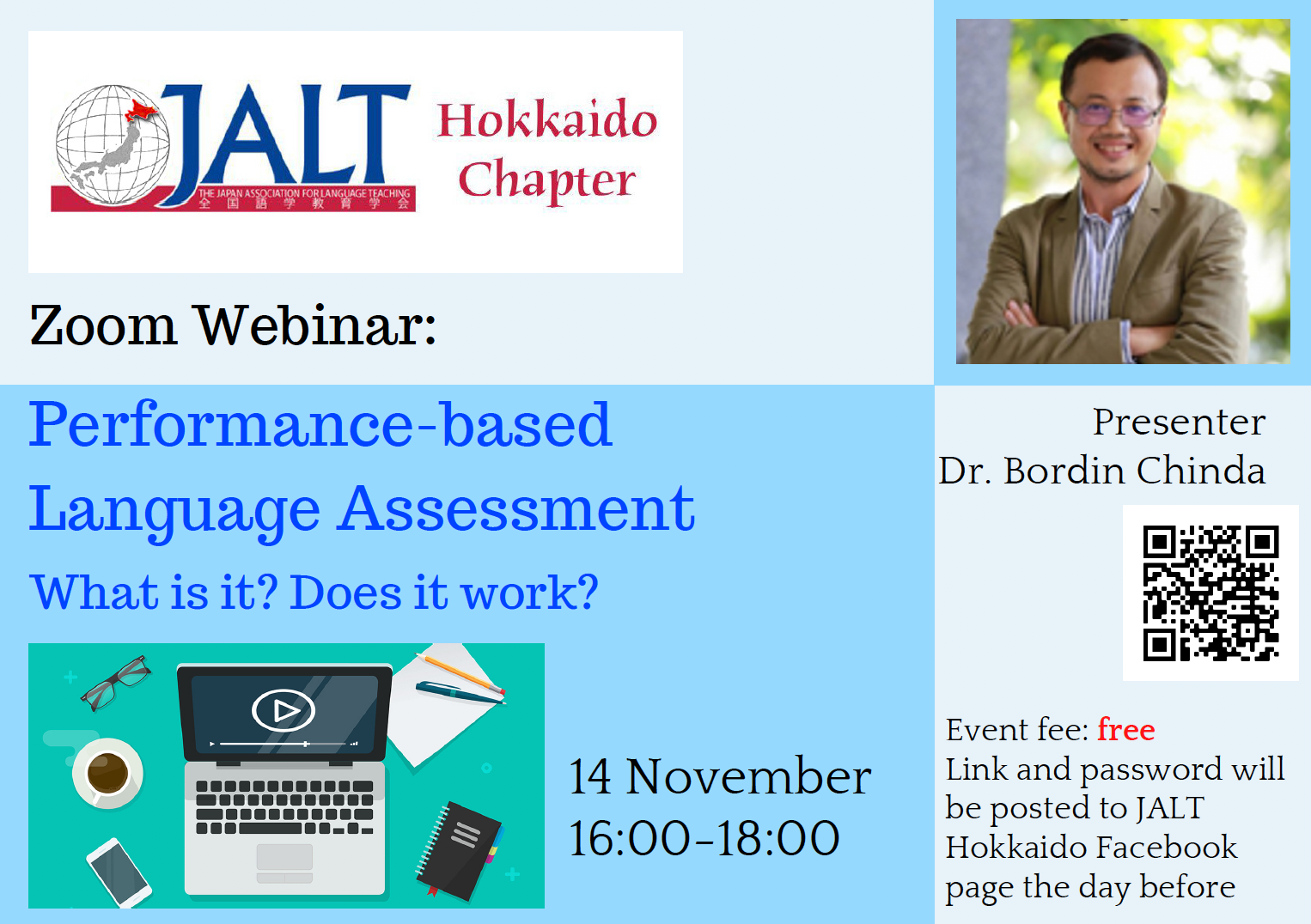
Zoom Webinar
Performance-based Language Assessment: What Is It? Does It Work?
Presenter: Dr. Bordin ChindaDate: 14th November, 2020 (16:00–18:00)
Event finished: Link to a video of the full presentation.
Event Fee : FreeAbstract
Performance-based assessment has gained more attention from ELT practitioners since the actual performances produced by students are evaluated in this type of assessment. However, the assessment of students’ performances involves more complicated procedures when compared with more traditional testing methods. This talk, therefore, will point out crucial considerations in adopting this type of assessment in a language class. First, the talk will introduce the concepts of performance-based language assessment and its major characteristics. Moreover, results will be presented from a research study aimed at examining the reactions of tertiary EFL teachers towards the use of performance-based language assessment. The last part of the talk will focus on how performance-based/classroom-based language assessment has been downplayed by national policies. Cases of national CEFR-based test development in Thailand will be used as illustrations.Profile
Bordin Chinda is an Assistant Professor at Chiang Mai University, Thailand. He holds a PhD in language testing and assessment from the University of Nottingham (UK). He is currently a visiting professor at Sapporo Gakuin University. Bordin has been involved in language education for over 20 years and has led various test development projects funded by Chiang Mai University and the Thai government. He also has given several workshops and presentations in Thailand and abroad. His research interest includes performance-based language assessment, washback and impact studies, and teacher education.ZOOM Webinarイベント参加費:無料題名:パフォーマンスに基づいた言語アセスメント:内容と効果発表者:ボルディン・チンダ博士日時:11月14日(土曜日)午後16:00 - 18:00学習者が実際に行ったパフォーマンスが評価されるため、パフォーマンスに基づいた評価はELT教師からより注目を集めるようになっています。しかし、生徒のパフォーマンスの評価は、従来の試験の方法に比べて複雑な手順を必要とします。そこで本講演では、このタイプの評価を言語の授業に導入する際に重視すべき点を取り上げます。まず、パフォーマンスに基づく言語評価の概念とその主な特徴を紹介します。さらに、高等教育機関で指導する言語教師によるパフォーマンスに基づいた言語評価の使用に対する反応を調べることを目的とした調査研究の結果を紹介します。最後に、国の政策によってパフォーマンスベース/教室ベースの言語評価がいかに軽視されてきたかに焦点を当てます。また、タイにおけるCEFRに基づいた全国的なテスト開発の事例を紹介します。タイ、チェンマイ大学准教授。英国ノッティンガム大学で言語テストと評価の博士号を取得。現在は札幌学院大学客員教授。同博士は20年以上にわたり言語教育に携わり、チェンマイ大学やタイ政府の資金提供による様々なテスト開発プロジェクトを主導。また、タイ内外で複数のワークショップやプレゼンテーションを実施。研究テーマは、パフォーマンスに基づいた言語評価、ウォッシュバックおよびその影響、教師教育。Some photos from the event below.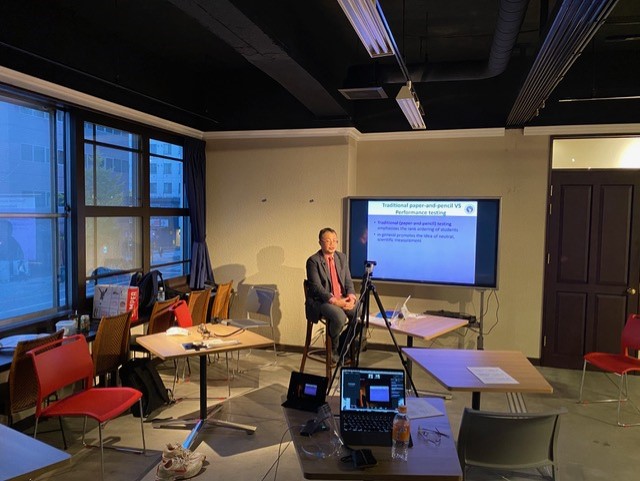
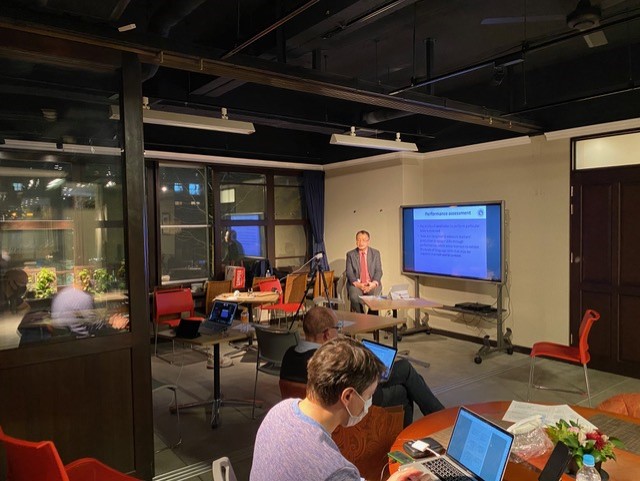
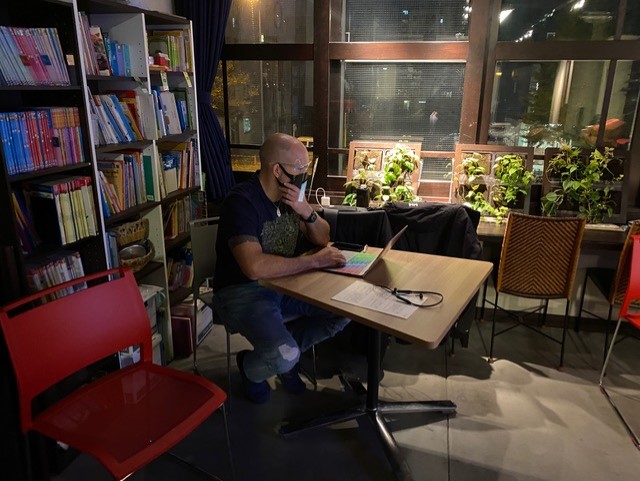
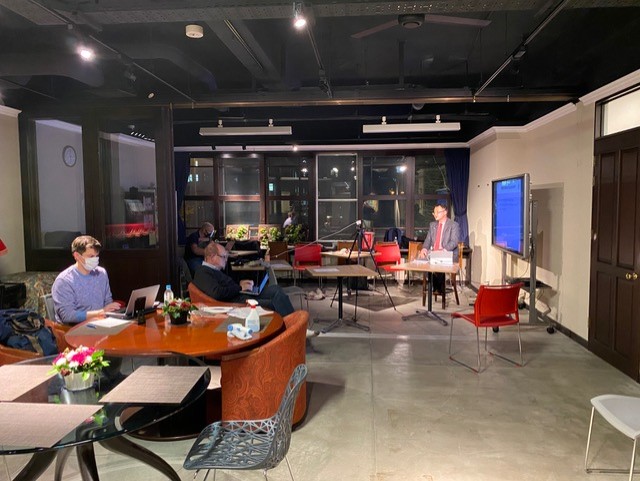
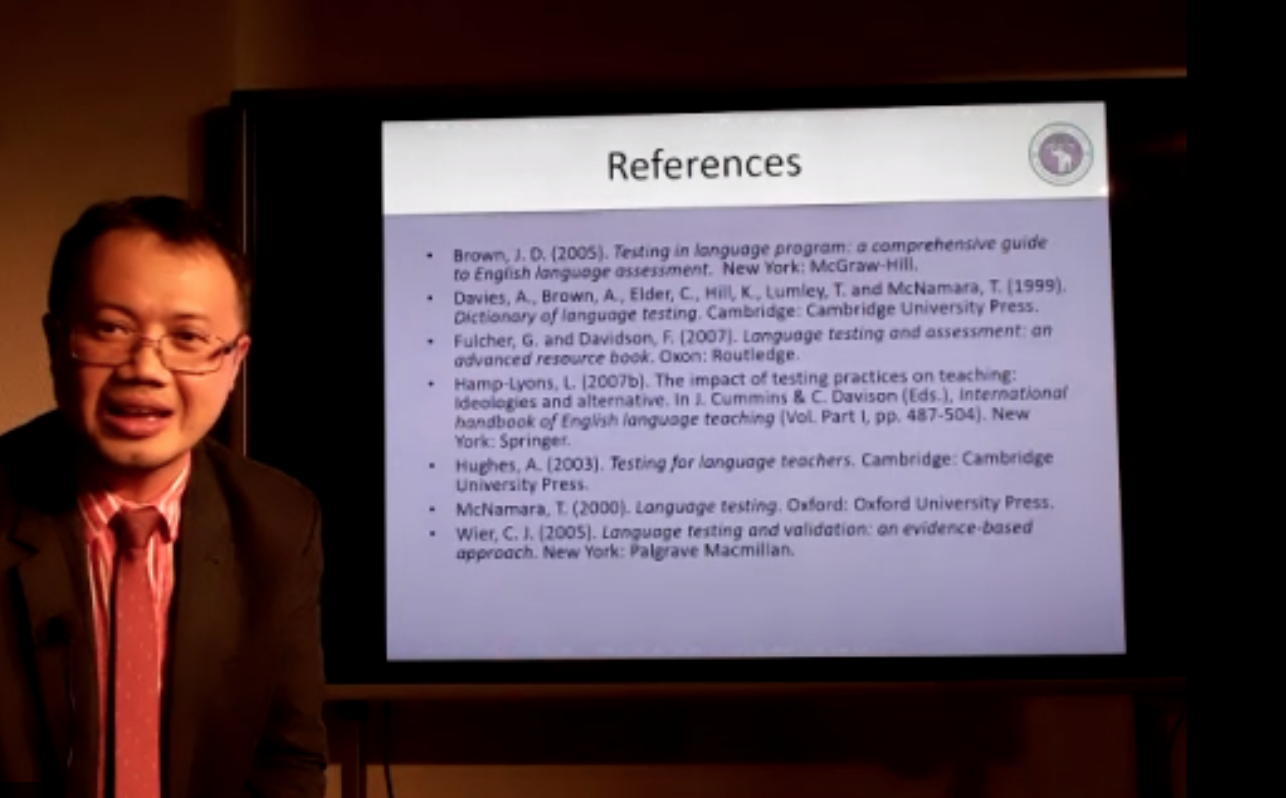
2020 Event 1 HMSW - September 1
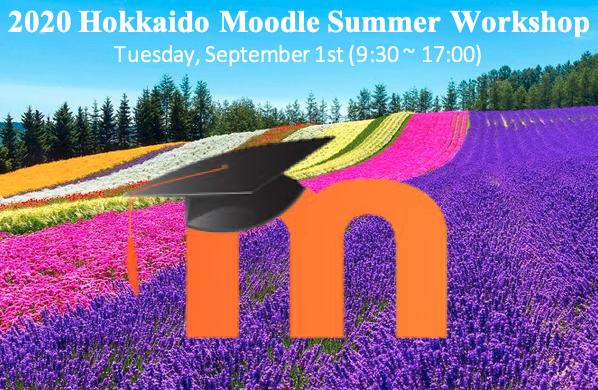
JALT Hokkaido will again co-sponsor the Hokkaido Moodle Summer Workshop (HMSW) this year.
2020 Hokkaido Moodle Summer Workshops (HMSW)
Tuesday, September 1st (9:30~17:00)
This one-day workshop is for anyone interested in learning Moodle, from those who have never used it to expert users. Find out what this powerful learning management system can really do for you and your students.
If you have never used Moodle before or have been thrown into the Moodle soup this semester and want to skill up for next semester, then you will want to attend this workshop.
There will be sessions on the basic Moodling such as course set up, attendance, assignment submission and grading, quizzes and many more!
Want to consult with an expert? We will have someone waiting for you in our day-long, online Moodle Help Desk Station. You can even tell us what you are interested in learning ahead of time when you register.
For the more experienced users there will be sessions on specific modules and ways to use Moodle in different subjects and classroom settings. There will be sessions for everyone! Workshops will be in English/Japanese/bilingual dependent on participants of each workshop.
Workshops will be both online as well as face to face (at Sapporo, Shiroishi Kumin Center). To support social distancing and public health, we have set face to face participation at a 25-person maximum. Online participation is unlimited!
You can register to participate or also submit an abstract if you would like to make a presentation by going to our website (majhokkaido.org)
● Please register as soon as possible!
● Abstract submission deadline – Extended to August 14, 23:59pm (Submissions after this date will be considered on a space available basis)
● Schedule details available from August 19
● Fee: free to all participants
Organized by: Moodle Association of Japan - Hokkaido Chapter, JALT Hokkaido and the Moodle Association of Japan.
2020年 北海道ムードル・サマー・ワークショップ(HMSW)
9月1日(火)9:30~17:00
このワークショップは、Moodleを使用したことのない方からエキスパートユーザーまで、Moodleの学習に興味のある方のためのものです。ムードルがあなたとあなたの学生のために何を可能にしてくれるのかを発見しましょう。
Moodleを使ったことがない方、または今学期にMoodleを使われなければならなくなったけれども来学期に向けてスキルアップしたいと思っている方、このワークショップに参加することをお勧めします。コースの設定、出席、課題の提出と採点、クイズなど、基本的なMoodle運用に関するセッションが行われます。
専門家に相談したいですか? 1日中オンラインのMoodleヘルプデスクがあります。またワークショップ前、事前登録する際に、あなたの知りたいと思うことを伝えておくこともできます。
より経験豊富なユーザのためには、特定のモジュールや異なる科目や教室でのMoodleの使用方法についてのセッションも行われます。すなわち誰にとっても有益なセッションがあります!それらは各ワークショップの参加者に応じて、英語、日本語、またはバイリンガルで行われます。
ワークショップはオンラインと対面式(札幌市白石区民センター)の両方で行われます。公衆衛生とソーシャル・ディスタンシングのため、対面で参加する場合の人数制限は最大25名までになります。オンライン参加は無制限です
参加登録と発表を希望される方は、ホームページ(majhokkaido.org)にアクセスしてください。
お早めにお申し込みください。
アブストラクト提出期限:8 月14 日 23:59まで延長(この日付以降の提出は、空き容量に基づいて検討されます。)
スケジュールの詳細は8月19日より公開します。
参加費:参加者全員 無料
主催:日本ムードル協会北海道支部、JALT北海道、日本ムードル協会
2016
2016 Feb
1. Effects of using English in high school homerooms
2. Valentine's Day tips for a happy team teaching experience: Beyond the static view of native and non-native teacher rolesPresenters: Hatsuko Itaya, Aiko Sano, Matthew Neapole
Date: February 14, 2016
Time: 2pm-4pm
Location: L Plaza (Kita 8-jo Nishi 3-chome), 4F, Dai Kenshu Shitsu B/ 札幌エルプラザ(北8条西3丁目」)4F, 中研修室A
Event Fee: JALT Members: Free; Non-members: 500 yen (JALT会員無料、非会員五百円 )
Event Description:
2pm~ Effects of using English in high school homerooms | Hatsuko ITAYA
2:30-3:00pm Networking and break time
3pm~ Valentine's Day tips for a happy team teaching experience: Beyond the static view of native and non-native teacher roles | Aiko Sano & Matthew NeapoleEffects of using English in high school homerooms | Hatsuko ITAYA
MEXT’s new policy for high school English education is that “classes are to be conducted in English in principle.” This guideline, however, is not always followed. The presenter conducted a survey and discovered that 82% of her students at high school preferred classes to be “examination oriented” rather than “communication oriented”, and wanted exam-related teaching to be given in Japanese. Therefore, the presenter used Japanese when explaining how to tackle complicated exam questions to make full use of limited class time. However, in order to increase students’ exposure to spoken English, the presenter conducted morning and afternoon homeroom (HR) sessions in English for two years. In addition, every day one student had to give an English speech for one minute during the morning HR. The result was that most of the students, who didn’t think the idea feasible, responded in questionnaires for two consecutive years that they wanted the English HR to be continued the next year. They also felt that the English HR was beneficial for entrance examinations. In addition, parents also expressed very positive attitudes toward this trial.
Valentine's Day tips for a happy team teaching experience: Beyond the static view of native and non-native teacher roles | Aiko Sano & Matthew Neapole
The Japan Exchange and Teaching Programme (JET) started in 1987 with only 848 college graduates from four countries. The number has grown substantially over decades with some 4786 new JET participants from 43 countries in 2015. The government of Japan is aiming at increasing the number of the participants to 6000 by the year 2020, when Tokyo hosts the Olympic Games. Since JET started, many problems have been pointed out about the programme and many teachers (both Japanese Teachers of English and Assistant Language Teachers) go through traumatic experiences of unsuccessful team-teaching. Often it is suggested that Japanese Teachers of English should take the non-native speaker teacher role and explain grammar and other complicated contents in Japanese or modified English, while Assistant Language Teachers should maximise the students’ exposure to the authentic use of the target language. Ideally they should take turns in leading classes so that they are teaching on an equal level. Is this really the best way to conduct team teaching? In this short presentation we will explore the (many) reasons why team teaching can go wrong, and analyse what made our team teaching a happy experience for both us and (hopefully) for our students.Bio:
Hatsuko Itaya is an associate professor at Hokkaido Musashi Women’s Junior College. She had been teaching at three different high schools and a cram school or Yobikou before taking up her current position in 2014. Her research interests include test washback, teaching methods for high school students and more recently she has been researching interpretation in sport. She has co-authored university exam prep books published by Obunsha and she is also the author of an exam prep book for high school students.
Aiko Sano is currently an associate professor at Hokkaido Bunkyo University. She taught at a public high school for 15 years while pursuing her MA degree in second language education at University of Toronto. Her main research interest is literacy development of bilingual children, and she is currently conducting research in Toronto, Hong Kong, as well as the Deaf school in Sapporo.
Matthew Neapole, Canadian. Born near Toronto, Ontario, grew up in Ottawa. Went to Carleton University, transferred to University of Calgary. Graduated May 2010. Came to Japan the following year, August 2011. Fifth year JET Assistant Language Teacher.2015
Nov 2015
JALT Hokkaido Social AGM!
Presenters: JALT Hokkaido members (and potential members)
Date: November 14, 2015
Time: 7:30 - 9:30pm
Location: Little Tree Takeaway (リトルトゥリーテイクアウェイ)
Event Description:
Why: A chance for JALT Hokkaido members, potential members and friends to get together to discuss ideas for events in 2016.
Ideas to be discussed:
New slate of officers
Is there a type of event you would like to see JALT Hokkaido host?
Is there a certain topic you would like to see addressed?
Is there a speaker that you would like to hear?
Are there venues for monthly meetings/ annual conference that you know of that we could use?
When are the best dates and times for events in 2016?
This is your opportunity to float your ideas in a social atmosphere.
Cost: Little Tree Takeaway is a cafe/bar.Nachos will be provided by JALT Hokkaido. Drinks and snacks will be pay as you go.
Please let us know if you can go by RSVPing Michael at michaelmielke@gmail.com by Thursday, November 12th.
Access: To get to Little Tree Takeaway, take the Tozai Line to Nishi 18 Chome station. Go out Exit 6. About 1 minute away heading south.
(アクセス:地下鉄東西線 西18丁目駅 6番出口すぐ裏!徒歩1分)
CALL-Plus Workshop
CALL-Plus Workshop
Presenters: various
Date: October 31, 2015
Time: 10am - 5pm
Location: Sapporo Gakuin University
Event Fee: JALT Members: Free; Non-members: 500 yen (JALT会員無料、非会員五百円 )
Event Description:
See the CALL-Plus Flyer and the CALL-Plus Schedule
Location: Sapporo Gakuin University, Building A, Room A-201, Ebetsu, Hokkaido
Schedule: Registration opens 9:30 am, Workshops 10-12am,
Keynote Presentation 1-2pm, Concurrent Presentations: 2-5pm,
Networking Party 5:30-7:30pm
Website: http://englishforum.sgu.ac.jp/callworkshop/CALL-Plus refers to all types of blended learning, where students and teachers employ face-to-face teaching for the majority of activities and integrate online activities to support and extend the learning. With blended learning, a 24-hour learning community is possible.
This year’s workshop is organized by members of the Sapporo Gakuin University English Education Study Group in cooperation with JALT Hokkaido. Contact Don Hinkelman <hinkel@sgu.ac.jp>, Matt Cotter <qtpiecotter@hotmail.com>, or Kate Sato <kate@kitopia.org> for more information.
JALT Officer Vacancies (October 2015)
JALT Officer Vacancies (October 2015)
Presenters: you?
Date: October 31, 2015
Event Description:
We are looking for volunteers to help us continue bringing educational and enjoyable events to our membership and the wider teaching community. If you are interested, or would like more information about these positions, please contact Mary (maryvirgiluchida@gmail.com), Michael (michaelmielke@gmail.com ) or Haidee (haidee.thomson@gmail.com).
Elections will be held online. More information about how and when will be posted later.
Chapter President (about 10 hours a month)
To be responsible for the chapter as a whole
To guide and assist the officers in their duties
To fill any vacancies when an officer is not able to continue
To communicate with the membership on a regular basis
Make announcements at monthly meetings
To send out updates to the membership on what is happening at both the local level and the national level.
To manage the officers’ meetings
Make the agenda to be followed at the meetings
Control the discussion to allow everyone to have a fair amount of time to speak and to call for a vote once everyone has had a chance to speak.
To represent the chapter as a whole at the Executive Board meetings (3 weekends a year) and report back to the chapter on what is going on at the national level. This duty can also be delegated to other officers as appropriate.
To work with the other Northern Region Presidents.
Programs Chair (about 8 hours a month)
To arrange speakers for chapter events
To arrange dates and venues for chapter events
To inform publicity chair of event details (date, venue, time, speaker bio, presentation abstracts etc.)
Publicity Chair (about 8 hours a month)
To keep the mailing list up to date by liaising with membership chair
Send out notices about upcoming events (mailchimp, facebook, JALT calendar)
Recording secretary (about 1-2 hours a month)
To write up summaries of events and post them to the JALT Hokkaido facebook page with photos
To send summaries and photos to the JALT Hokkaido webmaster for publishing to website
To take minutes at officer meetings
Webmaster (after initial learning of the system, about 1 hour a month)
To add updates about events
To maintain the site, hosting service and URL
Elections organiser (about 5 hours during Oct-Nov)
To organise the online voting system for annual officer elections
October 2015
World famous puppeteer: Juan Uribe
Presenters:
Juan Uribe

Date: October 18, 2015
Time: 1:30pm - 4:00pm
Location: EFLClub: 〒060-0042 Hokkaidō, Sapporo-shi, Chūō-ku, Ōdōrinishi, 28 Chome−2−6
Event Fee: JALT Members: Free; Non-members: 500 yen (JALT会員無料、非会員五百円 )
Event Description:
Context: Teaching Children
Content area: Elementary and Preschool (ELEM)
Format: Practice-Oriented Long Workshop
Language: English
Come learn how affective learning can engage and empower your students’ learning and your teaching. During this presentation we will explore how practical affective pedagogical practices can create nurturing mental models about student’s own learning, language uses, and their own linguistic competence. Join me in a journey with lots of play, imagination, and curiosity. Destination: language learning ownership.
Bio:
Juan Uribe is a teacher trainer whose passion is studying and sharing how children learn languages affectively through play, games, storytelling, and puppeteering. He has been in an amazing journey visiting language schools for children around the world where he has both conducted teacher development programs as well as enchanted young audiences with Buddy the Frog.
Juan holds a Bachelors degree in Education from the Catholic University in São Paulo (PUC-SP) and a Masters in Education in Human Development and Applied Psychology from the University of Toronto. He writes a blog called Children Learning English Affectively.
He has already presented at the Gifu, Nagoya, and Matsumoto chapters. Check out his work with affective language learning by visiting his blog: childrenlearningenglishaffectively.blogspot.ca
Asia-Pacific Virtual Exchange Association (APVEA) 2015
Asia-Pacific Virtual Exchange Association (APVEA) 2015
Presenters: various
Date: July 18, 2015
Time: TBA
Location: Muroran Institute of Technology
Event Fee: Free for everyone
Event Description:
Asia-Pacific Virtual Exchange Association (APVEA) 2015
<apvea.org>
Muroran, Japan, July 18-19, 2015
The inaugural APVEA conference will be held at the Muroran Institute of Technology in Japan, July 18-19, 2015.
The theme for the inaugural conference is "Borderless Communication Now - Theory and Practice"
Co-sponsored by JALT Hokkaido
Come and learn how virtual exchange is connecting students across the world. This is a good opportunity to hear from teachers who are collaborating across borders. You can catch up with the latest ideas and opportunities for your students to use English to communicate with students in other countries through online exchange. The program will include individual papers, symposia, workshops, presentations, and posters.
Telecollaboration and Language Learning: Present Trends and Future Tendencies
Presented by Dr. Melinda Dooly, Universitat Autònoma de Barcelona
The use of technologies in teaching and learning-including blended learning, telecollaboration and social networking-are no longer 'news' in the world of education. This is attested by the number of articles, books, journals and conferences which are focused on this theme. We are now at a point which Lamy and Hampel (2007) have called "integrative CALL” (p. 9) where multimodal, multimedia is used to promote online collaborative interaction aimed at shared socio-cognition. These exchanges can also underscore awareness and development of intercultural competence in an increasingly 'interconnected world'.
Considering that upcoming generations will carry out a good part of their work, leisure and daily life through virtual interaction, the ability to cope personally and professionally with the conditions and challenges of working and 'living' with others online is patent. Moreover, being able to communicate with others through diverse online tools in different languages will not be enough to be interculturally competent. Just as individuals need the inter- and intra-personal skills of face-to-face interaction, they will need to be communicatively effective persons in virtual interaction. Both teacher and student competences must be interrogated in light of growing opportunities for literally 'opening up' the classroom to seemingly infinite learning possibilities.
Along these lines, this presentation will a) consider the role that telecollaboration can play in promoting knowledge for today and tomorrow's world; b) provide various examples of telecollaboration in education as means of delineating parameters and features of this type of learning exchange and c) reflect on emerging critical issues related to telecollaboration 2.0.
Reference: Lamy, M-N., & Hampel, R. (2007). Online communication in language learning and teaching. Houndmills, UK/New York, NY: Palgrave Macmillan.
Dr. Melinda Dooly is a professor at the Universitat Autònoma de Barcelona. She was a founding member and one of the leaders of the INTENT project that has brought universities from around Europe together in online collaboration. She has written extensively on virtual exchange and is a leader in the field of education through virtual exchange. APVEA is extremely fortunate to have her as a keynote speaker.Borderless Life in the Digital Age of Education
Presented by Thom Rawson, Nagasaki International University
Virtual exchange is no longer the dream of technical entrepreneurs, researchers, and moviegoers. Physical borders fade as the connected masses move online to collaborate and communicate. What was once so fascinating and amazing about being online has now reached a sense of normalization in the Internet Age. How did we get here? What is happening now? What will the future bring? What are the implications for modern education as we know it? Information is no longer trickled down to users but flows steadily and near-instantaneously. Social media has revolutionized the way people connect and communicate in real time online. When the answer to each new question that arises is "Google it”, how do educators remain relevant in such an environment? Open-source and proprietary systems have combined to create a dynamic online landscape which stands in stark contrast with traditional classroom education. The divide between teacher and student grows smaller as information is no longer the institution of the few imparted to the many. Where some borders have all but disappeared, new ones have sprung up. How do educators continue to bring down the borders inhibiting learning while avoiding their own obsolescence? In this plenary talk, the speaker's experiences and observations will be presented for the purpose of promoting digital age acceptance and integration. Challenges that have been overcome, challenges currently being faced, and potential future challenges for online collaboration are shared in a manner which the presenter hopes will stimulate discussion and generate new ideas in the ways which educators collaborate across borders and bring education to the masses.
Thom Rawson is a Senior Assistant Professor at Nagasaki International University, Sasebo, Japan. He, along with his team, recently was awarded the New Technology research award at the 2014 Japan e-Learning Awards in Tokyo. The 5-member team has spent the last few years working together on networking LMS sites together for collaborative projects between universities. He has been instrumental in developing virtual exchanges for both his students and other practitioners around the world. APVEA welcomes Thom Rawson and is grateful he is able to offer his expertise at the inaugural conference.
Muroran Moodle Workshop
Summer Moodle Workshop at Muroran Institute of Technology, Hokkaido
July 18 (Sat) - 19 (Sun), 2015Presenters: various
Date: July 18, 2015
Time: TBA
Location: Muroran Institute of Technology
Event Fee: Free for everyone
Event Description:
Summer Moodle Workshop at Muroran Institute of Technology, Hokkaido
Jointly held with the Asia Pacific Virtual Exchange Association’s (APVEA) inaugural conference
テーマ: お互いに学び、そしてムードルコミュニティに感謝しょう!
Theme: Learning from each other & giving back to the community!
Do you use Moodle in your classes? Do you want to use Moodle but need to learn more first? This conference gives you the opportunity to share how you are using Moodle and learn from others about the wonders of this free online learner management system. If you would like to present, please submit your abstract via the Moodle site by June 7. You’ll need to register and submit at http://bgettings.com/moodle26/As always, there will be a variety of workshops and presentations on Moodle related topics. This year we will also have a special workshop on how to use Moodle in the math classroom. Prof. Kameda will do this workshop in Japanese so if you have any colleagues who are interested in using e-learning tools in their math classes, please pass this information on to them also.
今年のムードルサマーワークショップは北海道の室蘭工業大学で7月18、19日に開催致します。
そこで様々なムードル関連発表、ワークショップ、情報交換等もできます。
発表したい方も一般登録したい方も6月7日の夜9時までに、下記のリンクを通して、是非申し込んでください。
http://bgettings.com/moodle26本年度、特別なワークショップも用意しております。山口東京理科大学の亀田 真澄先生は「Moodle で数学 e-Learning を体験してみよう」とのワークショップを実施する予定しています。その内容は:
Moodle を日々利用している教職員の方々への『Moodle による数学 e-Learning』のワークショップです。
例えば Moodle で配信するサービスにおいて「数式を利用したい」「数学関数グラフを描画したい」「数式処理を利用したい」そして「数式を含む小テストを配信したい」等の ニーズに合わせて、次のステップに従って、システム構築方法および教育実践例を紹介しながら、最新の Moodle Ver.2.8 の実機環境を操作しながら行うハンズオン(Hands-on)形式のワークショップです。
1. 配信するWeb ページにおける数式の活用について
・TeX フィルタ、MathJax フィルタの違い
・AMS-LaTeX タグによる数式を含むコンテンツの作成
2. Moodle に適した数式処理システム Maxima について
・Maxima コマンドによる数式処理(四則演算、関数処理など)の実行
3. Moodle に適した数学グラフ生成ソフトウェア gnuplot について
・gnuplot コマンドによる数学グラフ(2次関数、三角関数など)の描画
4. 数学オンラインテスト評価システム STACK を利用した小テストについて
・STACK (含 Maxima)のインストールにおける注意点
・STACK を用いた問題(バンク)の作成
5. gnuplot を利用した数学グラフを含む小テストについて
・gnuplot コマンドによる数学グラフを含む小テストの作成
6. その他
・参加者の方々からのご意見・ご要望に応じて回答・助言いたします。
亀田先生のプロフィール:
・職歴・研究歴
S.62 東京理科大学大学院理学研究科数学専攻博士課程単位取得満期退学
S.62 東京理科大学山口短期大学講師
H.18 山口東京理科大学(基礎)工学部一般・基礎准教授(現在に至る。)
・学会活動
日本数学会、アメリカ数学会、日本ムードル協会、教育システム情報学会、日本教育工学会、日本数式処理学会、情報処理学会
・教育活動
H26 京都大学高等教育研究開発センター第3期 MOST フェロー活動(スナップショット)
https://most-keep.jp/keep25/toolkit/html/snapshot.php?id=277633924295785
もちろん、いつもと同じく、ムードルの入門ワークショップをはじめ、小テスト、フォーラム、ページの管理、評価などより詳しい機能別のデモンストレーションも行います。是非参加してください。
Enhancing Communicative Writing Instruction & EducationUSA
Enhancing Communicative Writing Instruction in the Course of Study for Foreign Languages
EducationUSA and Study Abroad Opportunities
Presenters: Dr. Gregory Glasgow & JoEllen Gorg
Date: June 14, 2015
Time: 1:00 - 4:00 pm
Location: Hokkai Gakuen University (北海学園大学), Room C30 Building 6 (Subway Building)
Event Fee: Free for everyone
Event Description:
1:00-2:30pm
Enhancing Communicative Writing Instruction in the Course of Study for Foreign Languages
(2:30-2:45pm Q&A)
Presented by Dr. Gregory Glasgow, Assistant Professor, Center for General Education Meikai University, Urayasu Campus. English Language Specialist at the U.S. Department of State (U.S. Embassy, Tokyo, Japan). Doctor of Philosophy (PhD) in Applied Linguistics, School of Languages and Comparative Cultural Studies, The University of Queensland, Australia.
The Japanese Ministry of Education (MEXT) has initiated a series of curricular reforms aimed to enhance the communicative competence of Japanese EFL learners. One skill in need of improvement is second language writing; according to MEXT, learners are expected to write English passages with due attention to main points and connecting words and phrases, demonstrating the ability to review and revise their written passages (MEXT, 2011). This workshop provides an overview of approaches to implementing EFL writing instruction at the secondary school level. Topics covered will be developing writing fluency, improving editing skills, distinguishing writing genres and giving effective writing feedback. Participants will learn practical tips about second language writing instruction that they will be able to immediately apply to their teaching contexts.
外国語の学習指導要綱におけるコミュニカティブなライティングの指導をすすめるために
文科省は日本人EFL学習者のコミュニカティブな能力の向上を目指し、教育課程の改定を初めており、ライティング技能も向上が必要とされる分野の一つであ る。同省によると、望ましい英文ライティングは、内容の主題、単語とフレーズのつながりがしっかりと意識されて書かれていて、かつ自らの文章を見直し訂正 する力が見受けられることとされる。本ワークショップでは、中高レベルでのライティング指導のあり方に対する複数の手法を取り上げる。ライティングにおけ る流暢さ、校正する力、ジャンルの区別をする能力を高め、効果的なフィードバックの与える方法についても取り上げる。参加者は実際の授業にすぐに取り入れ ることの出来るライティング指導法のコツを学ぶ。
2:45-3:15pm
Afternoon tea break
3:15-3:45pm
EducationUSA and study abroad opportunities
(3:45-4pm Q&A)Presented by JoEllen Gorg, Principal Officer U.S.Consulate Sapporo, Japan.
This presentation will be of interest to students thinking of studying in the U.S. and teachers sending students to study abroad. Practical information regarding scholarships, funding support and visa processes will be shared. EducationUSA is a U.S. Department of State network of over 400 international student advising centers in more than 170 countries. In Japan, the centers are located in Sapporo, Tokyo, Nagoya, Osaka, Fukuoka, and Naha. The network promotes U.S. higher education to students around the world by offering accurate, comprehensive, and current information about opportunities to study at accredited post-secondary institutions in the United States. EducationUSA also provides services to the U.S. higher education community to help institutional leaders meet their recruitment and campus internationalization goals. The presentation at Hokkaido JALT includes the structure and characteristics of U.S. higher education which many teachers and students in Japan are unfamiliar with.EducationUSAによる米国留学に関する説明
本講演は米国留学に興味を持つ学生や、学生の留学を支援する教師に向けてなされる。奨学金や基金、ビザ取得手続き等、具体的な情報について取り上げる。国 務省が管轄するネットワークのEducation USAは、世界170ヶ国以上の国々に400を超える数の留学生へのサポートセンターを展開し、日本国内では、札幌、東京、名古屋、大阪、福岡、那覇に設 置されている。認定を受けた高等教育機関での留学の機会の提供を目的として、学生へ正確で総合的かつ最新の情報を提供している。また、Education USAは米国の高等教育コミュニティに対して教育機関が学生の獲得をし、キャンバスの国際化が出来るよう支援も行っている。JAL北海道における今回の講 演では、日本に暮らす教師や学生にはあまり知られていない米国の高等教育制度とその特徴についても触れる。
Bio:
Dr Glasgow received his PhD in Applied Linguistics at the University of Queensland in Australia. He conducts local teacher training workshops organized by the U.S. Embassy in Tokyo and affiliated U.S missions and consulates in Japan to assist Japanese teachers and native-speaking English language assistants in teaching communicative English in English. The workshops explore how to increase opportunities for student communication using textbooks approved by the Ministry of Education, Culture, Sports, Science and Technology (MEXT), as specified in the new Course of Study for Foreign Languages for upper secondary schools.
JoEllen Gorg began her duties as Principal Officer at the U.S. Consulate in Sapporo in September 2013. Previously she served as political-military officer in the Office of Japanese Affairs in Washington, D.C. Other diplomatic assignments include tours in Micronesia, Pakistan and Nepal. Her first diplomatic assignment was at the U.S. Embassy in Tokyo.
Jan 2015
Understanding Bilingualism: バイリンガルって何?Presenters:
Barry Ratzliff, Shannon Koga, Dr. Tim GreerDate: January 25, 2015
Time: 2:00pm - 5:00pm
Location: Sapporo International Communications Plaza
Event Fee: Free for everyone
Event Description:
Overview: All are welcome to join us for three part program that considers what it means to be bilingual. Part I features a talk on bilingualism in education. Part II showcases an interactive Q+A panel featuring multiple perspectives on bilingualism. Part III presents a talk on bilingual identity in interaction. Participants may come and go between presentations. Presentations will be in English, Japanese or will be bilingual.
Part I. Bilingualism in Education
Barry Ratzliff and Shannon Koga - Hokkaido International School
Abstract: Many international couples begin their families with optimistic but vague ideas regarding the languages their children will encounter at home and at school. With twenty years of combined experience in international education, the presenters will draw upon actual cases and personal family experiences to present on what they have learned about bilingualism. They will share success stories and typical missteps and above all they will underscore the need for parents to consciously select and plan for a path to the kind of bilingual they would like their child to be. The presentation will look at the educational options that can be made and where and when it might be best to switch the primary learning experience from one language to the other.
HIS発表
教育における二ヶ国語主義
多くの国際結婚をした夫婦は、将来自分たちの子供が家庭と学校で直面する言語に関する事柄について楽観的、あるいは曖昧な考えを持った状態で子育てを開始 する。20年におよぶ国際的な教育の経験を元に、具体的なケースについて、また自らの家族の体験に関して、複数のスピーカーが二ヶ国語主義に議論する。う まくいった事例や典型的な失敗事例、とりわけ子供たちをバイリンガルに育てたいと望む場合に両親が意図して選択、計画を行う必要性を取り上げる。発表では 教育における選択肢と、幼少期の教育環境においていつ、どこで言語を変えるのかについて述べる。
Part II. Interactive Question and Answer Panel
Featuring Barry Ratliff, Shannon Koga, Tim Greer
Part III. Doing Bilinguality in Interaction
Dr. Tim Greer - Kobe University
Abstract: Identity does not simply exist. It is "talked into being" through interaction, and it is therefore made visible through the details of talk, including turn-taking, sequence, repair, membership categorization and socio-pragmatic actions. Nationality, class, gender, language and the myriad of other features that go to make up a person’s identity are all only relevant to other people in real-time to the extent that they are oriented to in the talk itself. However, they are not just mentioned—they are also used as resources to accomplish various actions, which is why they can sometimes become contentious issues for the participants in a conversation.
Drawing on research from Conversation Analysis, I will examine some of the ways in which bilinguality can be made relevant in conversation when interactants orient to certain items of cultural and linguistic knowledge that are normatively bound to the identity category "bilingual".
By analyzing a variety of naturally-occurring mundane talk, I will show how identities are used as interactional resources to help accomplish social actions, such as doing disagreement or selecting a next speaker, in addition to aligning and disaligning with other people. In so doing, I will show that bilingual identity is not a fixed state that antecedes any meeting between two people and predetermines the way they will communicate. Instead it is something that is talked into being by and through the details of the interaction, and is therefore being assembled and reaffirmed in situ in every instance of talk.Bio:
Barry Ratzliff
Born in Ethiopia and grew up on the west coast of Canada. Left Canada to teach in Japan after an education degree at Trinity Western University, British Columbia. Two years later opened a language school. Later completed a certificate in ESOL and joined the teaching staff at HIS. Completed a masters degree from Michigan State University. Served as principal of the HIS for three years prior to serving as Head of School. Has overseen the implementation and development of the Outdoor Education Program, the introduction of the International Middle School Curriculum and the opening of the HIS Niseko campus.
Barry Ratzliff 氏
エチオピア生まれ、カナダ西部で育つ。ブリティッシュコロンビアのトリニ ティ・ウェスタン大学を卒業後来日し指導を開始。来日2年後Language Schoolを開校。ESOLの資格を持つ。ミシガン州立大学の修士号取得。3年間のHIS校長としての勤務後、同校の代表(Head)となり、以降屋外 教育プログラムの展開、国際中等教育カリキュラムの導入、HISニセコキャンパスの開校を実施。
Shannon Koga
Born and raised in London, Ontario, Canada. Graduated from the University of Western Ontario with a BA in Linguistics. Came to Japan to teach English in 1989. Began teaching at Hokkaido International School as an ESL support person and went on to initiate the Drama program and redefine the English Language Learner's program. Currently administrator at HIS Niseko. Holds a Masters of Science in Curriculum and Instruction and is currently working on Principalship.
シャノン・コガ氏
カナダのオタワで生まれ育つ。University of Western Ontarioで言語学のBA取得。1989年に来日し、英会話の指導を始める。HISでESLをサポートする役職として勤務し、同校で演劇プログラムを 立ち上げ、英語学習者プログラム見直しにも携わる。現在はHISニセコ校のアドミニストレーター。科学のカリキュラムと指導法の修士号を持ち、現在は Principalship について取り組んでいる。
Dr. Tim Greer
Tim Greer is a professor in the School of Languages and Communication at Kobe University, Japan. In his research he makes employs Conversation Analysis to look at various aspects of bilingual talk and second language use, including Japanese-English bilingual interaction, receipt practices and identity-in-interaction. He is the past editor of the Japan Journal of Multilingualism and Multiculturalism and has published in Multilingua and the Journal of Applied Linguistics. His doctoral dissertation looked at the way multi-ethnic people accomplish aspects of their identity through bilingual interaction.
ティム・グリア博士
神戸大学学術交流支援研究部門教授。研究分野は 日英二か国語によるインタラクション、相槌、インタラクションにおけるアイデンティティを含む、会話分析からとらえた二か国語による会話と第二言語の使 用。「Japan Journal of Multilingualism and Multiculturalism」元編集者。「Multilingua」「The Journal of Applied Linguistics」著者。博士論文では、二か国語によるインタラクションを通じて、マルチエスニックな人々が自らのアイデンティティを確立する方法 を取り上げている。2014
Links to 2014 conference
https://docs.google.com/document/d/1YaVmAnP8Fb-SZN726AMYoogoDxGGhHUis7x4P-e5jI8/edit?pref=2&pli=1
2014 JALT Hokkaido Conference
JALT Hokkaido Conference: Elements of good teaching
後援: 北海道教育委員会、札幌市教育委員会、公益財団法人札幌国際プラザ
Pre-registration open now: get a discount and let us know numbers
Full Program online
Schedule at a glance (online) (download Sept. 11 version)Time: 10:00 - 17:30 (doors open at 09:00)
Location: Hokusei-Gakuen University (Sapporo), Building A, 5F & 6F
Fee: JALT Members - Free
Pre-registered Conference guests - 1500 yen (pre-registration opens from September 8th)
Non-registered Conference guests - 2000 yen
Students -500 yen
Details: http://jalthokkaido.org/conference/This year’s theme is “Elements of good teaching”. We will have presentations from all over Japan and Hokkaido on teaching children, junior high school students, high school students, college students and students of all ages at conversation schools. There will be something of interest for everyone, please join us for this exciting learning and networking opportunity!
Keynote Presenter: Eric Kane
10 Things that Great Teachers Do (Keynote presentation by Eric Kane)
We've all had great teachers. Teachers who have inspired and motivated us. Teachers who made us want to be better students. The good news is that we can all become that teacher for our students! This practical keynote presentation will look at 10 things that you can do starting Monday to challenge, inspire and motivate your students...and yourself!
優れた教師が行っている10の指導法
素晴らしい教師は我々のモチベーションを高め、目を見開かせ、よい学習者になりたいと思わせる。実は我々もそうした素晴らしい教師になることができる。本発表ではすぐに始められる具体的な10の指導法を取り上げる。Borderless Publishing - Going Digital (Workshop with Eric Kane)
The thought of turning ideas into something to be shared with others is a dream many teachers and authors have, yet traditional publishing models are often out of reach for most. There are other options. Opportunity is everywhere to deliver high-quality, effective materials to those all over the world in near-synchronous time. Learn about how one teacher has utilized these opportunities to partner with online content delivery systems to share learning materials with children and teachers around the world.
About Eric Kane: A teacher, teacher trainer and author with 20 years of experience, he is the founder and president of ELF Learning, an education company based in Japan which creates music, video and materials for young learners. ELF's publications include the Think Read Write Series, the Kids Songs Series and the beautifully illustrated picture book, Lily and the Moon. ELF also has a YouTube Channel for children with over 40 million views.
エリック・ケイン
教師、教師教育者、著者として20年の経験を持つ。EFLラーニングの創始者兼代表。日本国内の地方や全国で30以上の講演経験を有し、インドネシア、韓国でも様々なテーマでの若い学習者へ教授について講演している。Lunch meeting: We will also have our general meeting at lunch time during the conference. Officers will report on activities and we will vote on new officer appointments for the coming year. We are looking for candidates for Membership Chair and Programs Chair. Please contact us for more information regarding these roles if you are interested.
